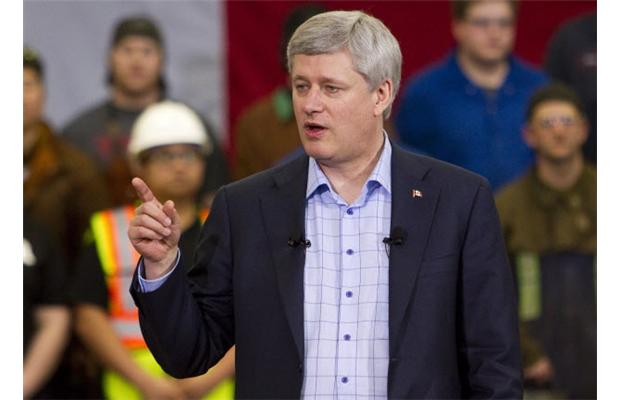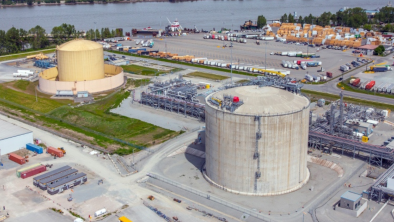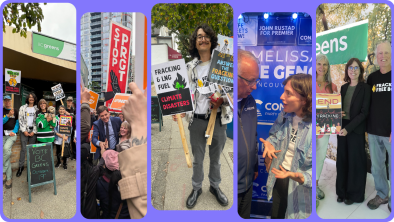Ottawa tax break boosts B.C. LNG
Thursday, February 19, 2015
Vancouver Sun

A federal government tax break to the liquefied natural gas industry announced Thursday was extolled by industry and Premier Christy Clark as making B.C. more competitive globally.
The federal tax break will last until 2024, Prime Minister Stephen Harper announced at a news conference in Surrey.
The break will save the industry a total of about $50 million over five years starting in 2015-16, but savings are expected to increase in later years if the industry grows as expected, said a federal government spokesperson.
Clark quickly thanked Harper for listening to the plea from the B.C. industry, which is still at the proposal stage.
Clark told reporters that B.C. already has a cost system competitive with Australia, but it must be competitive with U.S. jurisdictions, including the West Coast and the South. Australia is already a world-leading LNG exporter, while the U.S., like Canada, is trying to create a new LNG industry to export its vast supplies of gas to energy-hungry Asia.
“With oil prices where they are — and all the global uncertainty — the change the federal government has made is going to be a big help in making sure LNG companies get to that final investment decision,” said Clark, referring to a 50-per-cent drop in oil prices since last summer.
“We have to be more competitive today than we had to be six months ago,” she stressed.
The B.C. government had recently cooled its fervour on LNG development in the face of the falling oil prices, which cuts revenues to energy companies. A leading developer, Malaysian state-controlled Petronas, had delayed an anticipated 2014 year-end investment decision until the middle of this year.
There are more than a dozen LNG proposals in B.C., but only a handful of well-developed projects including those led by Shell and Chevron. No company has made a final investment decision.
Clark said Thursday her government still expects to see three LNG plants built by 2020, but industry analysts have been skeptical, saying only one to two plants will be built, if any.
The LNG industry said the tax break was a welcome step in making Canada a player on the global stage.
“This will help move the ball towards someone being in a position to declare a positive final investment decision, and hopefully that can happen this year,” said David Keane, president of the B.C. LNG Alliance, representing some of the largest LNG proponents.
The Canadian Association of Petroleum Producers (CAPP) has said it will allow companies to write off 90 per cent of their investments in seven years, rather than 27 years.
While some First Nations have supported LNG development, environmental groups have remained wary of the industry.
Wilderness Committee national campaign director Joe Foy said governments are giving away “more and more” to entice these industries, which will result in costly environmental effects on climate and water. He pointed to the use of hydraulic fracturing (known as fracking) to extract natural gas.
The federal government will establish a capital cost allowance rate of 30 per cent for equipment used in liquefying natural gas, and 10 per cent for buildings at LNG facilities. That measure will provide tax relief for capital assets acquired from Friday until the end of 2024.
“This measure will allow companies investing in new facilities that liquefy natural gas to create jobs and economic growth, while recovering their investment more quickly,” the government said in a news release.
The industry had been pushing since the fall of 2012 to get tax relief from Ottawa to give the industry a kickstart.
The federal capital cost allowance program (CCA) lets companies deduct a portion of the cost of certain equipment purchases immediately, and for the LNG industry the rate had been set at eight per cent.
The increase to 30 per cent, which will put more money back into the companies investing in the industry, will apply to equipment such as compressors, pumps storage tanks, pipelines “used exclusively” to transport LNG from the facility, according to the news release.
“Equipment used exclusively for re-gasification will not be eligible for the additional allowance.”
The tax break won’t apply to purchases of property acquired for producing oxygen or nitrogen, of electrical generating equipment, and of docks, wharfs and other structures.
Non-residential buildings at LNG facilities that had qualified for a six-per-cent CCA rate will now get a 10-per-cent break.
Last year, B.C. also cut a planned income tax on LNG plants in half to 3.5 per cent.
Photo: Prime Minister Stephen Harper makes an announcement regarding tax cuts for LNG projects at Kwantlen Polytechnic University in Surrey, B.C., on Thursday February 19, 2015.


